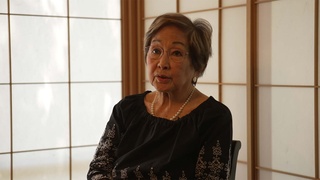Interviews
Identity (Japanese)
(Japanese) You know, well, I look back now on those times and… you know how people talk about their motherland, or homeland, right? Well, let’s see, of course that has to be my six, seven years spent in the US—the six or seven years after being born there, right? But then I went to Japan, and went through elementary and junior high school there. So there’s this, you know, the education, the environment that I grew up in and such [in Japan]. So actually, if asked whether identify myself as American or Japanese—at the time, I’d have to say that I saw myself as Japanese, and didn’t consciously identify as being an American.
…It’s called dual-citizenship—I had both American citizenship and Japanese citizenship. So the Japanese would say to me, “You’re American,” but since coming to Japan and living here, I felt, and my mother likewise felt, that we would never really be going “back” to America. I think we had a stronger feeling toward completely identifying ourselves as Japanese.
Date: June 17, 2008
Location: California, US
Interviewer: Yoko Nishimura
Contributed by: Watase Media Arts Center, Japanese American National Museum




